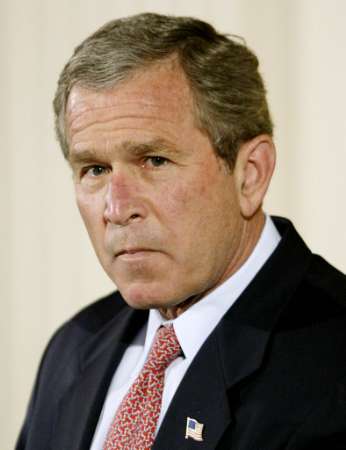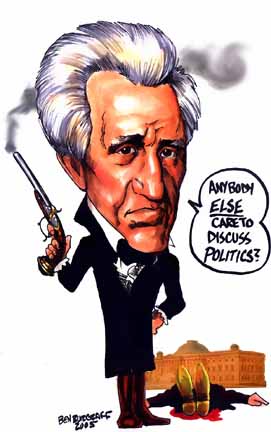 Perish the thought; however, it's possible. What if the Middle East transforms from a boiling cauldron of violence and hostility into a peaceful hub of American loving individuals in the next few years? What if our financial system once again serves as the model for the rest of the world to follow? You get the point. Anyone who has engaged in reading this blog knows what I think of President Bush, however, I am also aware of the difficulty of seeing the forest through the trees.
Perish the thought; however, it's possible. What if the Middle East transforms from a boiling cauldron of violence and hostility into a peaceful hub of American loving individuals in the next few years? What if our financial system once again serves as the model for the rest of the world to follow? You get the point. Anyone who has engaged in reading this blog knows what I think of President Bush, however, I am also aware of the difficulty of seeing the forest through the trees.
I never thought Ronald Reagan would go down as one of our greatest presidents, yet, less than two decades later, it seems as if he may just do that. Granted, he had something to do with the fall of the "evil empire", but for the most part, President Reagan added the finishing touches to an effort started long ago, which when combined with being in the right place at the right time, makes it appear as if he had more to do with it than he really did (Yes, I'm biased as he is not my favorite President, however he is not solely responsible). President Reagan did accomplish more than someone like me is likely to give him credit, as he also created the Earned Income Tax Credit, uncharacteristic of his presidential agenda, as it enables a disenfranchised America.
On the other hand, by pushing supply side economics and deregulating the shadow economy thus increasing the gap between the haves and the have-nots, President Reagan ignited a very egocentric, self-centered trend in our country that fueled the entitled, "overweight" America we see today...not to mention the Iran-Contra issue; ignoring the Aids crisis and many other blemishes that scar his leadership effectiveness.
Assessing leadership is difficult as it is not a moral concept in and of itself, yet it's almost impossible to evaluate someone as a leader outside of a moral context. All ethics and morality aside, Jesus Christ far "out-leaders" Hitler. Jesus influenced and continues to influence billions of people, thousands of years after his death and He did not use coercive techniques to unite his followers to share His vision. Hitler, on the other hand, amassed a large following, however his "leadership" did use brute force and over half a century later, has a handful of followers, at best.
However, comparing leaders is normally not that straight forward, with the exception of leaders like Jesus Christ and Gandhi, most leaders exhibit an egocentricity that leads to decisions that end up destroying as much as their leadership serves to restore. Consider Charlemagne. He was a great military leader and illuminated a very dark part of history, giving the people he ruled a taste of what it was like to live before the fall of Rome, however he also ordered the beheading of 3,000 people in a matter of a few hours for not adopting his new found belief, just one example of how bloodthirsty he could be. Was he a good leader? He was, overall a good leader, however, no one with a reverence for life can overlook his glaring inhumanity.
If we distinguish between leaders and tyrants, weeding out everyone who found it necessary to use brute force to remain in power, the task becomes somewhat easier, however even that runs into problems because "brute force" must be defined. What about the threat of "brute force"? What if leaders are more insidious and the "brute force" is not so apparent? Some leaders have, as much if not more blood on their hands, yet it's invisible to the naked eye.
George W. Bush will end up with the blood of thousands if not millions on his hands, however, if the Middle East ends up "democratized" and a peaceful land, wouldn't he rank up there with the great presidents of all time? Just as Ronald Reagan's legacy will always be the fall of the Soviet Union, if years from now, Iraq or the Middle East transforms, George W. will no doubt get the credit. Some of our greatest Presidents suffered the lowest ratings in the opinion polls at the time they served the country.
Whatever the eventual outcome regarding George W., we should, at the very least, judge our leaders on the "reality" they impose on the greatest number of people, rather than the personal weaknesses we all have that only affect those closest to them.
So, Monica Lewinsky was stuck with a dry cleaning bill of perhaps, $15 and maybe Hilary wept the tears of betrayal that 99% of our population has wept at some point in their lives, and "We, the people" go batshit crazy. On the other hand George W. sticks us with a bill of billions of dollars, maybe trillions of dollars, human suffering abound, and a death toll we'll probably never know the number.
“Scholars should remind us that leadership is not a moral concept. Leaders are like the rest of us: trustworthy and deceitful, cowardly and brave, greedy and generous. To assume that all leaders are good people is to be willfully blind to the reality of the human condition, and it severely limits our scope for becoming more effective at leadership.” -- Barbara Kellerman
Read more...



















